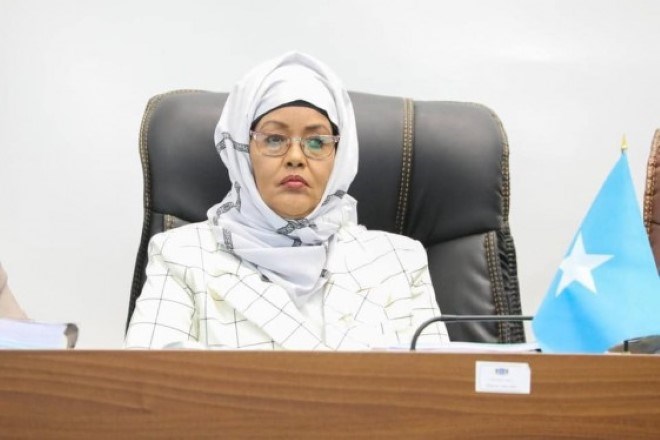
Wednesday November 30, 2022

Mogadishu (HOL) - The first deputy speaker of the Lower House of the Somali parliament, MP Sadia Yasin Samatar, has distanced herself from pushing the controversial Sexual Intercourse Bill, also known as the Penetration Bill.
The bill sparked outrage among Somalis and was seen as incompatible with Islam and Somali culture; after being introduced in parliament in 2020.
Speaker Yassin reiterated that she was not one of those advocating for the bill, and the parliament rejected it when it was tabled for debate.
She emphasized that she is one of the officials campaigning for the bill to be revised and renamed "Sharaf-dhowr" to align it with Islamic Sharia.
Speaker Yassin made the comments at an event marking 16 Days of Activism Against Gender-Based Violence in Mogadishu.
During the event, she said, "I will leave Mogadishu if the parliament does not pass the bill."
Many people believed that she was referring to the Sexual Intercourse Bill, which the parliament rejected before she was elected to deputy speaker of the parliament.
She argued that the bill protects the rights of the sexes, especially women.
The East African nation has high rates of child marriage and violence against women, including rape and female genital mutilation (FGM). The United Nations says 45% of women are married before 18, while 98% have undergone FGM.
She stated that she received death threats due to her support and advocacy for the bill and was accused of being an infidel.
In 2018, Somalia's cabinet approved the landmark Sexual Offences bill to criminalize various forms of gender-based violence, including rape, child marriage and sex trafficking.
Somalia's parliament drew
international condemnation in 2020 when it replaced the Sexual Offences Bill (SOB) with the Sexual Intercourse Bill. Critics of the latter said that it does not go far enough to protect the rights of women and girls. The UN urged Somali lawmakers
to reject the bill.
It had been pending before the Lower House of parliament for over two years until Augusto 2020, when a new bill, the Sexual Intercourse bill, was introduced before legislators.
High-ranking lawmakers in the previous parliament argued that the SOB bill went against Islamic shariah and that the ambiguity in the law's language normalized same-sex relations.
However, the Lower House parliament refused to debate and approve the controversial bill in response to calls to table the Sexual Offenses Bill for approval.